16 Tons of Corporate Hubris
My offense-o-meter has a pretty high threshold these days. Words & deeds I found offensive in the pre-Bush years are now met with a shrug and a sigh, and then it's off to the next outrage. How else is one to survive four and a half years of unbridled corporate aggression?
This phenomenon of lowered expectations is exemplified by my response to Randy Paul's recent post at American Street in which he notes his offense at derogatory remarks made by Hugo Chavez concerning Condoleeza Rice. Were those remarks misogynistic? They could be construed that way, although I believe the intended offense was directed at Rice personally, and since my contempt for her is boundless, I am willing to overlook the broader implications of those insults. Despite my semi-snarky response to Randy Paul, I feel compelled to acknowledge Randy is an astute political observer very much entitled to feel otherwise.
For me, though, there are so many utterly egregious, horrific crimes being committed by my own government - official actions which have immediate and detrimental consequences for humankind - that politically insensitive speech by a foreign head of state ranks extremely low among my indignations.
Leave it to a TV commercial to remind me of what it feels like to be genuinely offended, sending me into a fit of quietly boiling anger which cannot be adequately conveyed in HTML. Worse, I suspect the people responsible for this ad campaign, those conscientious philanthropists at GE, take great delight in its effect on me and others of like mind. With a wink and a smile, they likely describe the ad among themselves as an one which works on multiple levels, meaning it effectively dupes the ignorant while poking a sharp stick in the eyes of critics.
It starts off well enough, with dark shots of a coal mine and an unremarkable sillouhette of a man entering the mine. Must be an ad for Tylenol or Advil, I thought.
If only.
It quickly gets to the good stuff. Oh yeah, baby. Sexy coal miners, chiseled with a fine sheen of sweat from head to toe. No industrial attire for these hotties, save the miner's hard hats, which, in this context, appear as fetish wear. These wet, beautiful, youthful "miners"- when they aren't shirtless - sport sleeveless tees and, of course, the ripped abs (I've long called 'em fascist abs) that are all the rage in George Bush's hyper-narcissistic Amerca. Then there's that fabulous hair. Pretty boys. Pretty girls. White. Black. A little homoeroticism here and a little S&M there. Something for everyone.
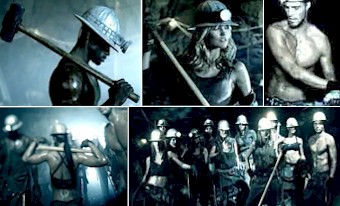
But it is the soundtrack to this absurdity which transforms the commercial from banal titillation to something much more malevolent.
Sixteen Tons
by Merle Travis
I was born one mornin' when the sun didn't shine
Picked up a shovel and I walked to the mine
I hauled Sixteen Tons of number 9 coal
And the straw-boss said, "Well, bless my soul"
You load Sixteen Tons, whadaya get?
Another older and deeper in debt
Saint Peter don't you call me cause I can't go
I owe my soul to the company store
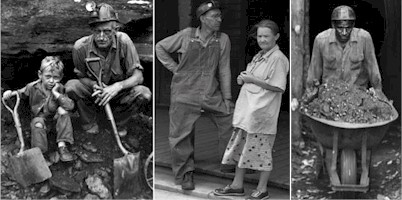
"Sixteen Tons" conveys the misery of being a coal miner: the toughness it required; the brutality fomented by the coal mining industry; the meager payoff. It would have been impossible for GE to have selected a song more inappropriate for extolling the virtues of coal. "I owe my soul to the company store," sums up the savagery to which the people of Appalachia were - and still are - used as pawns by the mining industry.
GE wisely chooses not to show us how a few gargantuan pieces of heavy equipment destroy entire mountains in order to get that coal today. We don't see rivers of sulphuric acid flowing through fragile ecosystems. We don't see the checks being cashed by elected representatives who betray the public trust so that those mountains can be legally obliterated for the likes of GE and other corporations. We don't see the pain of wives and husbands suffering one miscarriage after another due to illnesses caused by the coal mining industry. We don't see the graves of those consumed by cancer in statistically significant populations where Big Coal reigns supreme.
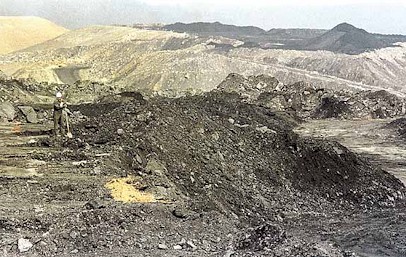
"More beautiful every day" thanks to GE & the coal industry.
It strains my eco-imagination to believe Merle Travis would appreciate GE's use of "Sixteen Tons" to ridicule of the blood, toil and misery of those so ruthlessly exploited by the coal industry. It is interesting that this song, like many folk songs in the Cold War hysteria of the 1940's and 50's - particularly those which championed workers - was considered commie enough to warrant harrassing its creator:
From www.earnieford.com:
Right back at'cha, GE. The feeling is mutual.
ADDENDUM #1: See also "GE's Greenwashing" (as referred by B12 Partners Solipsism)
ADDENDUM #2: The link to the MPEG at www.adrants.com is no longer active - probably because it was eating all their bandwidth judging from the number of Google hits I'm getting. I do have the MPEG (7.33 megabytes) but lack a means to host it. If you or someone you know cares to host this wretched assault on labor and the environment, send me an email - but please don't ask me to send it for your own amusement because I'm on an agonizingly slow dial-up connection.
This phenomenon of lowered expectations is exemplified by my response to Randy Paul's recent post at American Street in which he notes his offense at derogatory remarks made by Hugo Chavez concerning Condoleeza Rice. Were those remarks misogynistic? They could be construed that way, although I believe the intended offense was directed at Rice personally, and since my contempt for her is boundless, I am willing to overlook the broader implications of those insults. Despite my semi-snarky response to Randy Paul, I feel compelled to acknowledge Randy is an astute political observer very much entitled to feel otherwise.
For me, though, there are so many utterly egregious, horrific crimes being committed by my own government - official actions which have immediate and detrimental consequences for humankind - that politically insensitive speech by a foreign head of state ranks extremely low among my indignations.
Leave it to a TV commercial to remind me of what it feels like to be genuinely offended, sending me into a fit of quietly boiling anger which cannot be adequately conveyed in HTML. Worse, I suspect the people responsible for this ad campaign, those conscientious philanthropists at GE, take great delight in its effect on me and others of like mind. With a wink and a smile, they likely describe the ad among themselves as an one which works on multiple levels, meaning it effectively dupes the ignorant while poking a sharp stick in the eyes of critics.
It starts off well enough, with dark shots of a coal mine and an unremarkable sillouhette of a man entering the mine. Must be an ad for Tylenol or Advil, I thought.
If only.
It quickly gets to the good stuff. Oh yeah, baby. Sexy coal miners, chiseled with a fine sheen of sweat from head to toe. No industrial attire for these hotties, save the miner's hard hats, which, in this context, appear as fetish wear. These wet, beautiful, youthful "miners"- when they aren't shirtless - sport sleeveless tees and, of course, the ripped abs (I've long called 'em fascist abs) that are all the rage in George Bush's hyper-narcissistic Amerca. Then there's that fabulous hair. Pretty boys. Pretty girls. White. Black. A little homoeroticism here and a little S&M there. Something for everyone.

But it is the soundtrack to this absurdity which transforms the commercial from banal titillation to something much more malevolent.
Sixteen Tons
by Merle Travis
I was born one mornin' when the sun didn't shine
Picked up a shovel and I walked to the mine
I hauled Sixteen Tons of number 9 coal
And the straw-boss said, "Well, bless my soul"
You load Sixteen Tons, whadaya get?
Another older and deeper in debt
Saint Peter don't you call me cause I can't go
I owe my soul to the company store
Narrator: "Imagine if a 250-year supply of energy were right here at home. Now, thanks to emissions reducing technology from GE Energy, harnessing the power of coal is looking more beautiful every day. Another product of pure eco-imagination. GE: Imagination at work."Imagination, indeed.

"Sixteen Tons" conveys the misery of being a coal miner: the toughness it required; the brutality fomented by the coal mining industry; the meager payoff. It would have been impossible for GE to have selected a song more inappropriate for extolling the virtues of coal. "I owe my soul to the company store," sums up the savagery to which the people of Appalachia were - and still are - used as pawns by the mining industry.
GE wisely chooses not to show us how a few gargantuan pieces of heavy equipment destroy entire mountains in order to get that coal today. We don't see rivers of sulphuric acid flowing through fragile ecosystems. We don't see the checks being cashed by elected representatives who betray the public trust so that those mountains can be legally obliterated for the likes of GE and other corporations. We don't see the pain of wives and husbands suffering one miscarriage after another due to illnesses caused by the coal mining industry. We don't see the graves of those consumed by cancer in statistically significant populations where Big Coal reigns supreme.

"More beautiful every day" thanks to GE & the coal industry.
It strains my eco-imagination to believe Merle Travis would appreciate GE's use of "Sixteen Tons" to ridicule of the blood, toil and misery of those so ruthlessly exploited by the coal industry. It is interesting that this song, like many folk songs in the Cold War hysteria of the 1940's and 50's - particularly those which championed workers - was considered commie enough to warrant harrassing its creator:
From www.earnieford.com:
The song's chorus came from a letter Merle received from his brother lamenting the death of World War II journalist Ernie Pyle, killed while covering combat in the Pacific in 1945. John Travis wrote, "It's like working in the coal mines. You load sixteen tons and what do you get? Another day older and deeper in debt." Merle also recalled a remark his father would make to neighbors when asked how he was doing: "I can't afford to die. I owe my soul to the company store. " This referred to coal-company owned stores where miners bought food and supplies with money advanced by the company, called "scrip".
...Later released on Capitol's 1947 LP "Folk Songs From The Hills", the song almost immediately began to generate controversy, causing Travis himself, problems, in the anti-communist, Cold War hysteria of the late forties. Some in government saw songs dealing with workers' woes, and folk music "activists" as potentially subversive. It made no difference that Travis was a true American patriot. Veteran Capitol producer, Ken Nelson, who worked at WJJD radio in Chicago in the late forties, recalled in a 1992 interview that FBI agents advised the station not to play Travis' records, because they considered him a "communist sympathizer," which was, of course, completely untrue.Today, earth-raping, humanity-killing GE is "the company store" and we all have an account there whether we want it or not. This ad is an in-your-face fuck you from one of America's most accomplished corporate thugs.
Right back at'cha, GE. The feeling is mutual.
ADDENDUM #1: See also "GE's Greenwashing" (as referred by B12 Partners Solipsism)
ADDENDUM #2: The link to the MPEG at www.adrants.com is no longer active - probably because it was eating all their bandwidth judging from the number of Google hits I'm getting. I do have the MPEG (7.33 megabytes) but lack a means to host it. If you or someone you know cares to host this wretched assault on labor and the environment, send me an email - but please don't ask me to send it for your own amusement because I'm on an agonizingly slow dial-up connection.











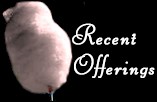
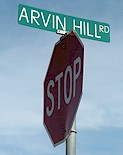


<< Home